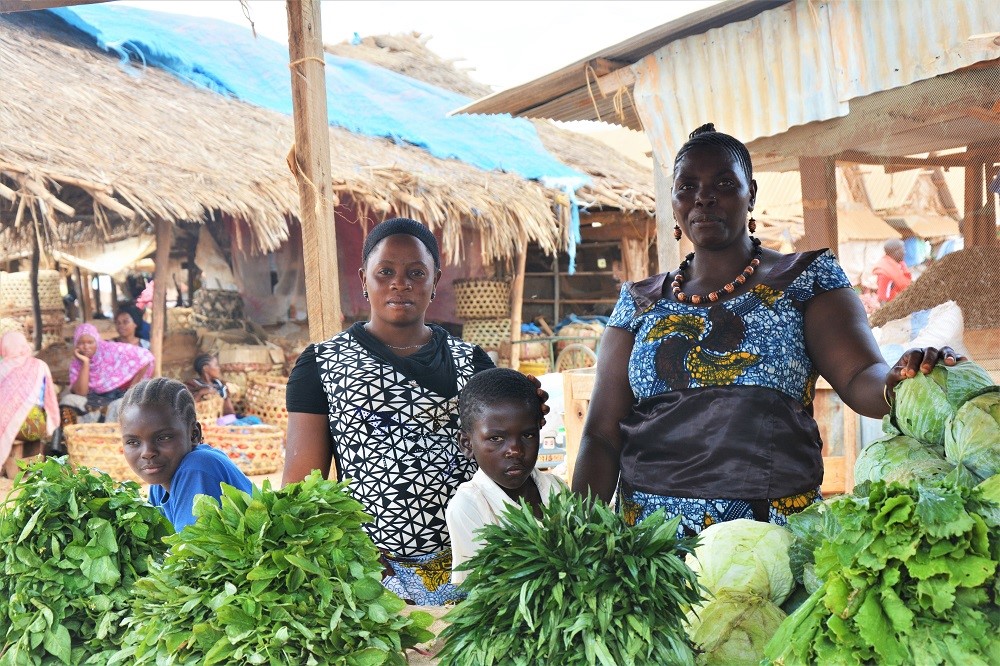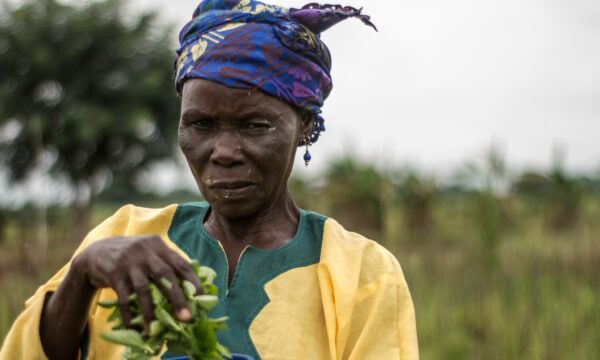
The Power on your Plate summit recently took place in Arusha, Tanzania. This important pan-African event explored the role of traditional African vegetables in diversifying and strengthening food systems, reducing poverty, energising industry and improving health and income across Africa. During the summit, speakers considered ways in which obstacles can be overcome to boost traditional African vegetables in the food chain.
Dr Morris Akiri, Regional Director of CABI Africa, was invited to speak on the high level panel about Advancing the coordinated agenda on traditional African vegetables. Joining him were experts including Judy Matu, Association of Women in Agriculture Kenya, James Mwangi, Group Managing Director of Equity Bank and Edilitruda Temba, Sales and Marketing Manager of East-West Seed in Tanzania.
The moderator, Susan Mugwe, asked questions about the place of traditional African vegetables in the food value chain. Why have traditional African vegetables not been a part of mainstream agriculture and food policy? What needs to be done to elevate their status? How do farmers find ways to finance the production of traditional African vegetables?
She also focused on the role of women in vegetable farming. Women understand the nutritional benefits of feeding their families traditional African vegetables, but they do not have the necessary decision-making authority in their homes to say, “This is what I want to grow on the farm,” even though they are the ones providing the labour. How can women be empowered to benefit from farming traditional African vegetables?
Ms Matu commented that women (and young people) face many similar challenges, one of which is communication. Wide gaps exist between policymakers and researchers, and women and young farmers. To link them more closely, financial institutions need to make inclusive decisions “from the ground up” to see how they can help women financially. Availability and accessibility of good quality seeds is another challenge that may be improved by establishing community resource centres.
An important part of the debate concerned seed and vegetable research. Ms Mugwe asked Dr Akiri how he thought governments ought to incentivise sectors such as research institutions to prioritise traditional African vegetables in national strategies and address the production of improved seed varieties and challenges such as climate adaptation.
Dr Akiri replied by acknowledging the gap in policy to support traditional African vegetables. He commended the commitment from farmers, especially women and young farmers, to producing these vegetables and drew attention to pilot schemes in African countries where trial sites are being used to help discover how traditional African vegetables can be produced, so that they can move away from farmer seeds and towards improved seed varieties.

“I think we’ve still got a challenge, because you find that over 90% of traditional African vegetables are still coming from farmer seeds from the fields. So governments need to come up with policies that encourage the improvement of such seeds,” he said.
He further explained that for that to happen, many other policy interventions would first be needed and that creating more awareness about the vegetables would help to stimulate demand. He highlighted the main issue: as long as we are not in a position to increase demand, micro produce will still not be taken up, particularly by people living in urban areas. Governments have a key role to play in making opportunities available, especially in developing policy instruments that encourage farmers to de-risk production.
Concerning financing for traditional African vegetable production, the chair highlighted a disconnect or lack of information from banks, which are telling producers they have the financing to support them, while producers themselves say how difficult it is to gain credit. She pointed out that farmers “are not afraid of farming, they’re just afraid of the risk”. She asked how we begin to have a conversation about addressing this.
Dr Akiri highlighted that producers are often too small for the bigger institutions but too big for the smaller ones. So how do we make them bankable? How do we make these ventures economical? He mentioned farmer associations as well as entrenching the economic and nutritional value of traditional African vegetables in school feeding programmes.
He commented that the drawback we have for traditional African vegetables is the size or scale at which production is met. We need to think about having incubation centres where we can showcase what we know about their economic and nutritional value – statistics that can inform policy. There is a disconnect but a lot has begun to happen to close the gap.
An audience member asked about the lack of investment in training people on the application and use of pesticides on vegetables. He explained that people will not buy local vegetables from markets because they find traces of pesticides. He asked why there was not more investment in integrated pest management.
Answering this question, Dr Akiri talked about the gap in extension service provision where 3,000 or more farmers are served by one extension officer and drew attention to the CABI-led Plantwise programme which supports government systems by taking extension closer to farmers through plant clinics. He explained that CABI trains farmers in pesticide use, recommending natural biocontrol or biopesticides to manage pests and diseases when possible.
Working in partnership with governments, CABI has created various manuals, using the ‘red, yellow and green list’ for pesticides. Green is safe to use while red indicates the pesticide should be used with caution and within government guidelines.
He mentioned that CABI has various initiatives and training programmes that work alongside agro-dealers, extension services and governments to ensure we do not use harmful pesticides.
For more information about the Power on your Plate Summit see CABI shares expertise on strengthening and diversifying food systems at all-Africa vegetable summit.
For more information about CABI’s work on traditional African vegetables see Promoting Good Seed in East Africa.
Related News & Blogs
Workshop explores Horizon Scanning options to identify and prioritize pests of threat to EAC Partner States
CABI has joined forces with the East African Community (EAC) Secretariat to hold a horizon scanning workshop in Tanzania to train Partner States on the identification and mitigation of priority crop pests which threaten livelihoods and food security. S…
16 September 2024




